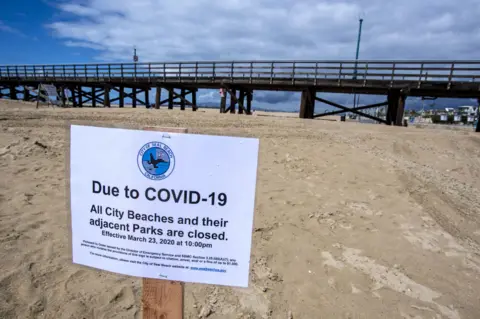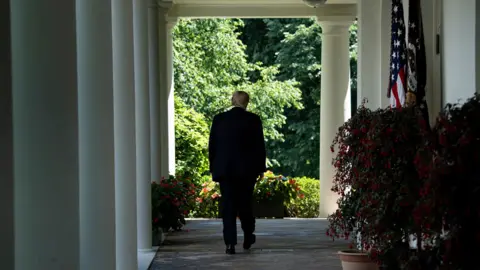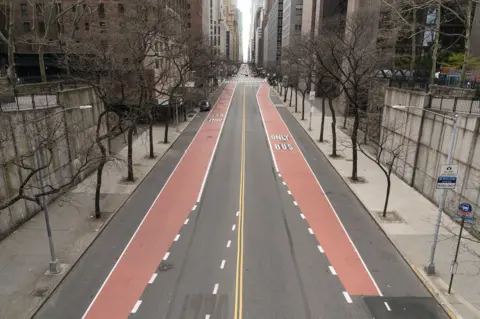Coronavirus: Trump knows economic meltdown brings political pain

 Getty Images
Getty ImagesThe latest US unemployment numbers were predicted to be catastrophic. The actual total, 3.3 million, turned out to be even worse than expected.
The record-breaking amount reflects a US economy put into deep-freeze almost overnight. The government-ordered shutdown hasn't just shuttered businesses temporarily, it has vaporised the jobs of millions of Americans - many of whom are the particularly vulnerable hourly service workers who live paycheque to paycheque.
The stock market free-fall and early reports of layoffs foreshadowed Thursday's grim news, prompting Congress to craft its largest-ever aid package, which passed the US Senate Wednesday night. The test now will be whether the multi-trillion-dollar relief will do enough, quickly enough, to staunch the bleeding.
What's clear at this point, however, is the physical disease that is afflicting tens of thousands of Americans and growing will be accompanied by an economic ailment that adversely affects the lives of millions.
Like Congress, the White House has also seen the coming economic tsunami - and what it could portend. Earlier this week, Donald Trump said he was anxious to reopen businesses and get Americans back to work, representing a shift of focus from earlier statements about doing everything possible to stop the spread of the virus.
The political reality for Trump is there will be very real consequences for his presidency not only if the US death toll from the coronavirus pandemic continues to mount, but also if the US spirals into a deep recession.
While this is uncharted territory, a nation in economic turmoil early in an election year is a serious threat to a president's political hopes. There are few more reliable indicators of ballot-box success or failure than the state of the economy.
When times are bad, financial hardship becomes a roar that drowns out all other concerns.
For the moment, the president has seen a modest rise in his public approval ratings, suggesting the possibility of a rally-around-the-leader effect, as Americans accept hardship in order to overcome an external threat.
While there's been nothing quite like this in modern US history, past crises - such as the 1990 Gulf War and the 9/11 attacks - produced ever more marked surges in presidential support. In both cases, however, those numbers eventually dropped, whether due to the long grind of suffering or an economic downturn.
George W Bush's numbers after the attack on the World Trade Center and subsequent Iraq War held up long enough for him to win re-election. His father, George HW Bush, whose post-Gulf War glory quickly faded with the onset of a recession, was not so fortunate.
Trump's call for the nation to get back to work has been echoed by other conservatives who are more bluntly suggesting that aggressive measures to save American lives may not be worth the extended economic distress they require.
 Getty Images
Getty ImagesThe president's rhetoric sets up a potential conflict in the coming days with many governors, Republican and Democrat, who have the ultimate authority in their states and will be reluctant to ease the restrictions on their populations. The move might allow Trump to deflect some of the blame for the ongoing economic pain, however.
"You should have done it my way" is a more politically defensible position than "my way has caused you this pain, but it's worth it".
There's also the possibility that some Trump-friendly governors might be inclined to side with the president, setting up sharp divides within the nation between some states that opt for an extended lockdown and others that ease their restrictions. For instance, the governor of Mississippi recently issued an order essentially limiting the ability of the state's local officials to impose their own business-closure orders.
Trump has also lashed out at a familiar foe, the US press. In a Wednesday night tweet, he accused the "lamestream media" of pushing for businesses to remain closed as a way of undermining his re-election hopes.
"The real people want to get back to work ASAP," Trump wrote.
It's an indication that the coming general election campaign is very much on the president's mind.
Already the president's political opponents are sharpening their attacks, sensing a long-term vulnerability on his handling of the viral outbreak. Priorities USA Actions, a liberal group, has begun airing an advert using audio clips of Trump's early dismissiveness of the threat of the virus superimposed over a chart of the growing number of cases in the US.
The president's campaign has filed a cease-and-desist letter to remove the spot from the air, noting that one of the quotes suggests Trump called the virus a hoax, when in fact he was referring to media coverage of it.
 Getty Images
Getty ImagesThere is ample evidence of the president downplaying the threat the virus posed in the early days of the outbreak, however. Whether or not the president's lawsuit is successful, if the medical and economic pain continues to grow, there will be similar adverts coming in the days ahead.
Three million Americans without jobs - 3m Americans facing desperate times and open to desperate measures - has the potential to be a powerfully destabilising political force.
Congress's aid package, with its one-time payments to individuals and expanded unemployment benefits, is aimed at ameliorating some of the economic pain and avoiding massive unrest.
If Thursday's job numbers is just the first wave of an economic onslaught, however, it may not nearly be enough. And the president seems to sense this.


- A SIMPLE GUIDE: What are the symptoms?
- LESSONS FROM ASIA: Six things the US can learn
- EXPLAINER-IN-CHIEF: The face of America's fight against Covid-19
- TRUE OR FALSE: Five Trump claims fact-checked
- HUMAN COST: 'My income vanished overnight'

